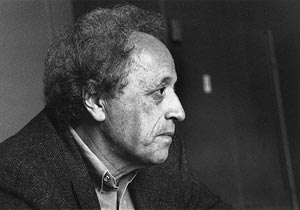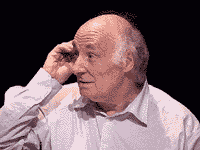French Poetry since 1950:
Tendencies II
by Jean-Michel MAULPOIX
- Translated from the original French by Catherine Wieder
My purpose is to run again along the poetical space of this
half-century, « pointing » out the most significant tendencies that have emerged in the course of the most recent
decades. In order to be clearer and offer a far better educational perspective, I will grant each of them a verbal determiner to sum it up, though I am well aware that it may not be sufficient enough to account for the complexity of tendencies taking place during each
period.
1960 : Figuring
A new generation of poets seem to emerge around the sixties. It is a decade marked by the overwhelming influence of human sciences, by the development of structuralism, the primacy of the textual and of the political, of research and avant-gardes. The era of subversion follows the era of suspicion. It is the time of the Oulipo and of Tel Quel. Attention turns away from landscape and focuses upon writing.
Born for the most part of them in the thirties, the most representative writers of this new generation are Michel Deguy, Denis Roche, Marcelin Pleynet (who all three belonged to the committee of Tel Quel), or again the Oulipian Jacques Roubaud, and the subversive Bernard Noël.
The cultural circumstances lead to a multiplication of theoretical propositions, as are to be found in the flourishing of militant publication : « TXT », « Change », « Chorus ». A polemical atmosphere of political and ideological upheaval characterizes this century that will find its acme in May 1968. Innovations and breakings up multiply therein. For the time being, what is at stake is epistemology. Reading Saussure, Jakobson, Althusser, Greimas and Lacan increases the crisis of poetry that had already been latent during the preceding decade. A large scale enterprise on language develops while the notion of «textual writing », which tends to substitute itself for that of literature, imposes itself. In the 1960 summer issue of Tel Quel Jean-Pierre Faye insists that the word « poetry » is « the ugliest word in the French language ».
The work of language thus becomes the very object of
poetry. One becomes more and more interested in the power of transgression. According to Bernard Noël, «language is born of a breaking up, all of a sudden it can no longer bear being at the service of its
references, naming them, reflecting them. The French language is quite naturally submitted to the signified : it has to offer
evidence, give the detail of the accounts, edict rules, give some
representation. But all of a sudden, there's a breaking up which is not a general one, but surges from one's specific mouth which becomes the point wherefrom the revolution starts up. »
The poetical act is thus willingly perceived as a revolutionary act. Writing must re-enliven language by establishing a singular relationship which dissociates it from its traditional articulation. The poet becomes he who imposes a new rhythm, a new way of saying or of provoking the real. But this task of revitalization may also rest on an unusual use of tradition, of « source-texts » and of their inherited formal models. Such is for example the case of the work of Jacques Roubaud who is influenced by the works of the troubadours or by the fixed forms of Japanese poetry, like the tanka. The constraint is thus deliberately chosen, according to the Oulipian pattern, as a principle of invention.
Whereas for the poets of the preceding generation the patient placing into perspective of distances gave open way to
presence, the writers who appear during this new decade will privilege motifs of « surface » and « speed ». For Denis Roche, as for Michel
Deguy, writing poetry means retranscribing with abruptness the sputtering of the modern. Denis Roche calls upon the spirit of Ezra Pound, whose work was introduced into France with the translation of the Cantos by René Lautrès in 1958. He says he had been stunned by the swiftness of his writing :
« Pound too had understood everything just at once glance without any kind of torment. Without any rules. Without any data. Without any footage. He had heard that something was ceaselessly spluttering. That an almost mad teleprinter, but also maybe a highly lucid one, with a true stubbornness and cynicism, was transmitting out in space (i.e. outside America) and out of time (since at the same time from everywhere and from all times). »
¨ For Denis Roche, poetry is like photography, a matter of focus : it aims and frames, it slices the world into sequences of images. (For Jacques Roubaud, it will be a matter of mathematical sequences serving as formal models). Thus poetry outstripped common language. It proceeds through electro-shocks and short-circuits. It constitutes a « surface language ». About this, Denis Roche wrote :
« One is well aware of it : there's no human activity, whether artistic or not, or even less literary, but of surface. Hence billions of men stuck by the soles of their feet on to the huge lawn of the earth and who don't care at all for the content. Hence façades of houses and buildings they erect perpendicularly on it ; hence sheets drying, hence the horizon which is the ECG of the dying, the horizontal scoffing at the vertical ; hence canvasses painted by painters after the latter have checked they were tight enough between their wooden frames, hence too sheets of paper, international format, on which writers always desperately strain themselves to lay down and spread their ink or type carbon paper ; hence of our skin which is the only thing we know of our bodies. »
¨ Dominique Fourcade will illustrate a little later in his own way the photographic bias for speed in a curious volume entitled « Rose trigger » whose title revives the old poetical cliché of the rose, this time become that of the camera
diaphragm. He insists that poetry is a writing « all in flights and contemporary percussions ». Language itself constitutes the site of an infinitely mobile relationship with the
contemporary. Writing is a matter of motivity, a question of speed, of accelerations or dead stops, an incessant shifting : « Whether one rages or
controls, one remains a single point in the world, and that is its extremity ». In «Outrance utterance », he also writes :
« I wish I could shorten, more and more, again and again, to the utmost smallest point of voluptuousness whose length would be adjustable to the infinite, a point of absolute pain and communication, the most intense linguistic point in the world wherefrom one would be able to ponder once more over the whole length of love. »
If I have thus kept « figuring » as being emblematic of this
period, it is because all of these authors put forward the concept of
relationship. Relationship is poetical or what is poetical is
relationship. The same word « figure » in French refers to the aspect of
things, to faces and to turns of phrases. Poetry is where the real
comes, in the strictest sense, to take figure (shape). As Michel Deguy showed
it, figuration summons to appear (almost as in court) : it enables things to appear through
comparison. Connotation is the major poetical fact. A word becomes within a given context the signifyier of a
signified. Multiplying isotopes, the poetical text is
polyphonic. Images, correspondences, metaphors, poetry says one thing through
another. It is the kingdom of analogies. The relationship thus indicates a specifically human way in which to inhabit the world. A way of being that one might say is both at once filled with wonder and
dramatic. Filled with wonder by the huge metaphors at
play, dramatic too nonetheless because we do not possess the object that we covet : we have access only to figures, to
allegories, to enactments. We remain at once both bound and
separated. Poetry's vocation is not to solve these contraries, but to make them appear in front of each other and live
together. When Michel Deguy spells the word « Po&sie » (« Po&try ») by inscribing at its heart the
ampersand, he places it completely under the sign of
conjunction/disjunction. He understands it and practices it as a « generalized metaphorical status ». «
Poetry, like love, risks everything on signs », he
writes. Or again elsewhere : « My life is the mystery of the as if ».
By confronting these poets who appeared in the sixties with their predecessors whose works began to emerge in the fifties, we thus see emerging in broad strokes an opposition between two kinds of poetry: one looking towards the side of the elemental landscape in order to therein re-discover the feeling of presence, the other which values more city, history, circumstance, the accidental and the chancy. With Jaccottet or Bonnefoy, Nature remains present and a link is set by the very poetical experience, between the ephemereal and the eternal. Hence, the meaning of the key-idea of the « true place ». For Michel Deguy, conversely, such a place could only be represented but by the partitioning world of the « like ». It is the figure that allows the inter-belonging. In it, the scattered elements of a scrappy world joint. The loss of meaning gives free rein to a « generalized figuration ». It is therefore no longer neither the being (the subject) nor the world (nature) who serves as center, but language itself. The latter is the only one that can allow a new visibility of that which is. The world is what takes place in the poem : a huge share of liabilities. Since any reality is liable to being joined to another by the grace of a « like », « the world becomes an infinite combinatorics of possibles which the poet reveals, in a way, to itself, because it is the very seat where figures work themselves a way up, or delineate themselves. » The evolution of French poetry in the seventies will lead to an even greater stress on this privilege of the text, nay of the literal with respect to landscape.
Next page, Settling, 1970







